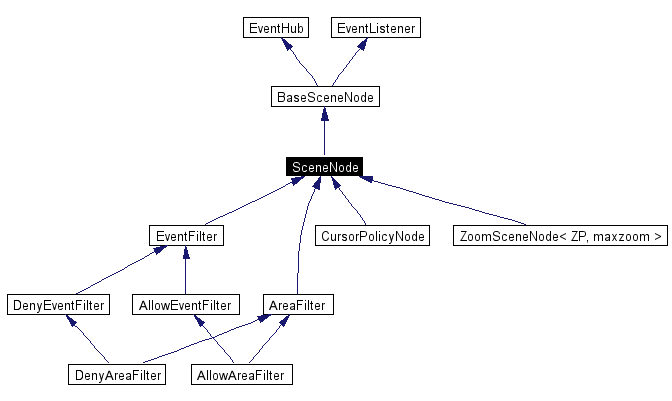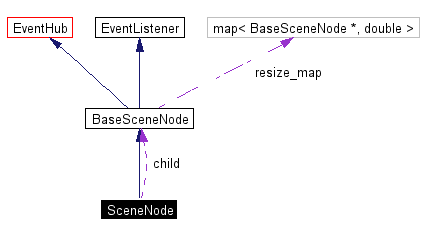
#include <scenenode.h>
Inheritance diagram for SceneNode:


Public Member Functions | |
| BaseSceneNode * | get_child (void) |
| virtual bool | handle_event (Event *) |
| virtual bool | handle_message (Message *) |
| void | get_boundrect (double &, double &, double &, double &) |
| virtual bool | check_event_fitspixels (Event *) |
| virtual void | register_event_listener (const char *, EventListener *) |
| virtual void | unregister_event_listener (const char *, EventListener *) |
| void | translate (double dx, double dy) |
| void | rotate (double ax, double ay, double rad) |
| void | move (double newx, double newy) |
| SceneNode () | |
| SceneNode (BaseSceneNode *) | |
| void | add_child (BaseSceneNode *) |
Protected Attributes | |
| BaseSceneNode * | child |
|
|
|
|
|
|
|
|
this one always returns NULL for BaseSceneNode. SceneNode and GroupNode override this function. Reimplemented from BaseSceneNode. |
|
|
call the base event handler in all nodes because it provides checks for node visibility and mouse event fitting into bounding rectangle. Reimplemented from BaseSceneNode. Reimplemented in CursorPolicyNode, EventFilter, AreaFilter, and ZoomSceneNode< ZP, maxzoom >. |
Here is the call graph for this function:

|
|
messages are intended to a certain node but can be processed by nodes directly higher up (i.e. decorator nodes). Beware that this can be slow for large graphs but using smart group nodes can help. Reimplemented from BaseSceneNode. |
Here is the call graph for this function:

|
||||||||||||||||||||
|
This function should be overloaded in every node to provide for event handling and repaint. Implements BaseSceneNode. |
Here is the call graph for this function:

|
|
This function should be overloaded in every node to provide for event handling. Implements BaseSceneNode. |
Here is the call graph for this function:

|
||||||||||||
|
Reimplemented from EventHub. |
Here is the call graph for this function:

|
||||||||||||
|
Reimplemented from EventHub. |
Here is the call graph for this function:

|
||||||||||||
|
Reimplemented from BaseSceneNode. |
Here is the call graph for this function:

|
||||||||||||||||
|
Reimplemented from BaseSceneNode. |
Here is the call graph for this function:

|
||||||||||||
|
Reimplemented from BaseSceneNode. |
Here is the call graph for this function:

|
|
|
|
|
|
 1.3.5
1.3.5